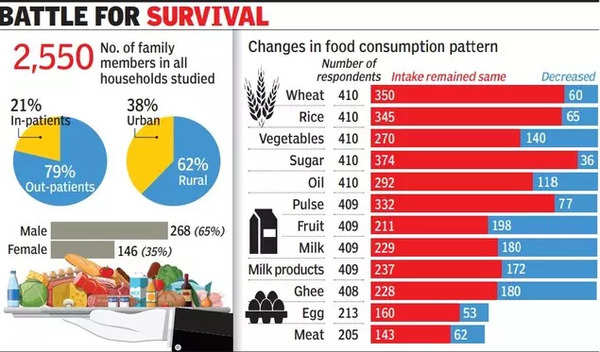
According to the study, more than 80% of the families did not change the intake of cereals, pulses and sugar, but reduced consumption of fruits, followed by ghee, milk and milk products, vegetables, meat, egg and oils.Dr Anoop Saraya, who led the study, said, “The plausible explanation could be that cereals and pulses are cheaper and can alone be taken as a meal, whereas fruits are expensive and also do not satisfy hunger.”
Other factors associated with dietary decrease were families having reduced expenditure on necessities (food, health and education), depleted savings after illness, loans taken, household assets sold or spouses not working after illness in the family.
The study, published in journal Emerald Insight, was done to determine the impact of increased out-of-pocket expenditure on healthcare exerting budgetary pressure on households and causing changes in dietary consumption. The hospital based cross-sectional study involved 414 patients with a chronic or major illness attended at a tertiary care public hospital. Each patient represented a household with a total number of family members of 2,550 in the study.
A chronic disease was one with conditions lasting one year or more and requiring regular doctor visits and limited daily life activities or both. Examples were chronic pancreatitis, inflammatory bowel disease and chronic liver diseases.
Researchers observed that the rural families with decrease in dietary item consumption numbered 1.8 times higher than urban households. Households with admitted patients suffered a 1.3 times decrease in food consumption. Not only were the dietary items reduced after illness in the family, but the food quality too was compromised, for instance, by diluting milk and gravies or buying unpackaged, cheaper food items.
Besides, the catastrophic effects of extra expenditure on illnesses were also visible in children, where a significant number of households with dietary decreases compromised on children’s education or the children started working to augment family finances.
According to the researchers, health expenditure should be increased through public sector policies for uniform healthcare. There is a need for more studies to identify measures that could be put in place when designing policies and interventions for the uniform distribution of benefits.